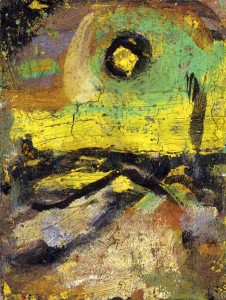 At “Good Letters,” words are what we work with.
At “Good Letters,” words are what we work with.
Of course, this is true of all blogs, all writing. Yet consciousness of the craft of writing is key to our posts. No matter what our declared subject, our undeclared subject—our subtext—is always what are my words doing here? What can words do—anywhere?
Words Made Flesh: it’s on our “Good Letters” logo.
That short phrase reverberates with many meanings. The Christian connotation, yes: the Incarnation. But that’s a singular Word. Singular, unique. Whereas we spin out many words. To make them flesh, we try to immerse them in our personal experience. Or we immerse ourselves in our experience and seek for words there.
Either way, we try to make our words more concrete than abstract, yet here I am, talking in abstractions.
The experience we seek words for usually has a spiritual dimension. And then we’re plunged into the conundrum that poet and essayist Christian Wiman speaks about in his interview in the current Image (76): “How does one even begin to speak of God?”
Parsing a poem by Seamus Heaney, Wiman says that “those who use religious language” can learn from Heaney’s craft: for instance “the way abstraction derives its meaning from the concrete, a meaning which it then exponentially enlarges.”
I can’t read a word of Wiman’s poetry or prose, without awareness of the death that hangs over him, in the form of his life-threatening blood cancer.
What could be more concrete than death? Than our mortality?
We flower like the flowers of the field
The wind blows
and we are gone
And our place never sees us again.
Psalm 103. The concrete as metaphor. Metaphor as the concrete.
Yet before living with his dread diagnosis, Wiman might not have asked “how does one even begin to speak of God?”
Naturally (very naturally), we all live with death hanging over us. But most of us, understandably, do our best to distract ourselves from this fact. Those flowers of the field that are gone with the wind are not the metaphor we choose for our lives.
What metaphors (what words) do we prefer?
Life as a journey. The path of life. Sailing life’s seas. Oh dear, no! Not metaphor as cliché!
Those flowers have more to offer. Their blossoming as life’s hope and beauty and fragrance. Their beauty as trust in God (consider the lilies of the field…).
And considering the lilies of the field, I recall R.S. Thomas’ “Bright Field”:
I have seen the sun break through
to illuminate a small field
for a while, and gone my way
and forgotten it. But that was the pearl
of great price, the one field that had
the treasure in it.
Field as pearl, as treasure, as glimpse of paradise on earth.
And considering metaphors of paradise on earth, I recall Denise Levertov’s “A Clearing”:
What lies at the end of enticing
country driveways, curving
off among trees? Often only
a car graveyard, a house-trailer,
a trashy bungalow. But this one,
for once, brings you
through the shade of its green tunnel
to a paradise of cedars,
of lawns mown but not too closely,
of iris, moss, fern, rivers of stone rounded
by sea or stream…
One is sheltered here
from the assaultive world
as if escaped from it, and yet
once arrived, is given (oneself
and others being a part of that world)
a generous welcome.
It’s paradise
as a paradigm for how
to live on earth,
how to be private and open
quiet and richly eloquent.…
This poem is one of my favorites for exemplifying religious abstraction made concrete. As the clearing at the end of the driveway becomes a metaphor for paradise, paradise then becomes a metaphor for poetry, and—at the poem’s end—poetry a metaphor for paradise:
It is paradise, and paradise
is a kind of poem; it has
a poem’s characteristics:
inspiration; starting with the given;
unexpected harmonies; revelations.
It’s rare among
the worlds one finds
at the end of enticing driveways.
The meaning at the end of the driveway has certainly (to use Wiman’s term) “enlarged exponentially.” What could be larger than paradise? What could be larger than a poem?
In the same issue of Image, former “Good Letters” writer Kelly Foster reviews Wiman’s new book of prose, My Bright Abyss: Meditation of a Modern Believer. She writes that Wiman “is rendering a modern prose meditation in the style of poetry that grapples with the ultimate ancient questions—what does it mean to have faith? What is the purpose of suffering? What role does poetry play when life is falling apart? What does heaven really mean?”
For Levertov, heaven means the paradise that is like a poem. It is a heaven that we can sometimes experience on earth, like a clearing “at the end of enticing driveways.” A heaven that shares poetry’s characteristics of “unexpected harmonies, revelations.”
Maybe—just maybe—this is how we can, in Wiman’s words, “begin to speak of God.”
Peggy Rosenthal is director of Poetry Retreats and writes widely on poetry as a spiritual resource. Her books include Praying through Poetry: Hope for Violent Times (Franciscan Media), and The Poets’ Jesus (Oxford). Click here for a full list of books. She also teaches an online course, Poetry as a Spiritual Practice, through Image’s Glen Online program.
Art above: Landscape, Georges Rouault















